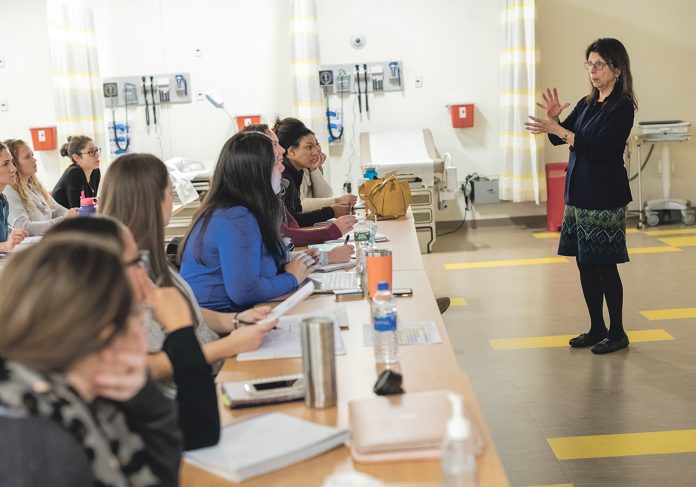Nationwide, and here in Rhode Island, the health care industry is suffering from a documented shortage of qualified nurse practitioners.
Employment in the sector across the United States is expected to grow by 31 percent during the 2016-2026 decade, according to the Bureau of Labor Statistics, in order to meet a growing demand.
Attempting to stem the tide, colleges and universities are creating programs to train the next generation of nurse practitioners, but the process is not a fast one.
When it comes to creating new courses at the University of Rhode Island, the state’s flagship research institute, said Denise Coppa, it’s not like “turning a kayak; this is turning a cruise ship.”
The fall 2018 URI course catalog included a psychiatric mental health nurse practitioner master’s program. Coppa, interim associate dean of graduate programs for URI’s College of Nursing, estimated the master’s degree was developed internally for roughly three years, “maybe longer.”
Applauded by the Rhode Island mental health treatment community, and partially funded by the federal government, the master’s degree program is designed to prepare current psychiatric mental health nurses to take the American Nurses Credentialing Center certification exam. That way, added Coppa, they will be able to treat psychiatric mental health patients to their “full practice authority.”
Coursework includes psychiatric assessment and diagnosis, as well as neuro-psychopharmacology and integrated treatment for older adults. Experiential learning is part of the curriculum and will see students get hands-on training at local hospitals, community health centers and private practices.
The university previously offered a psychiatric mental health clinical nurse specialist program, which, at the time, allowed interested students to graduate from the program and treat mental health patients. Then, health care law was changed, explained Coppa, and in order to treat mental health patients, those specialists were required to be licensed as nurse practitioners.
Describing nurse practitioners as “autonomous,” Coppa said “all nurse practitioners can work without being supervised by physicians.”
However, for mental health nurses to gain that level of independence – and be able to treat children and adults as well as prescribe medications and implement therapy – they must now be licensed.
When the Comprehension Addiction and Recovery Act was signed into law by President Barack Obama in 2016, it required such accreditation. Coppa said the new requirement was one of three catalysts that pushed the URI College of Nursing to launch the master’s program.
A global “deficit” in medical professionals trained in psychiatric mental health care, Coppa said, also played a role in the creation of the program. The final factor, she added, was the volume of local “advanced-practice nurses” that now need to receive a license in order to prescribe the necessary medications to treat psychiatric and mental health patients.
Given the change in law, there are “a lot of people who needed to go back to school” in order to address the demand, Coppa said.
Deb M. O’Brien, president and chief operating officer of The Providence Center for Counseling & Psychiatric Services, is excited by the solution the program will create.
“With the shortage of available prescribers in the state, it’s really important we have a nursing cadre that can supplement and fulfill the needs of the clients who need behavioral health services,” she said.
O’Brien, also chair of the dean’s nursing advisory board at URI, said nurse practitioners are trusted members of The Providence Center community.
“We use nurse practitioners in several of our outpatient programs,” she explained. “There’s even some talk” of employing them to care for the “severe and persistently mentally ill.”
In fact, with more than a semester left in the program, The Providence Center has already agreed to hire “at least one or two” of the soon-to-be graduates, O’Brien said.
Charles Alexandre, chief nursing officer at Butler Hospital, said the URI program “is long overdue.”
In the past, he added, Rhode Island “hasn’t had a good pipeline for master’s-prepared nurse practitioners in psychiatric mental health nursing.”
He hopes the experiential learning aspect of the program will entice students to remain local and seek employment at Rhode Island hospitals and treatment centers.
“Recruiting can be challenging,” said Alexandre. “Having a program in Rhode Island, and students who can hopefully do rotations here, can help introduce them to the hospital.”
Six students are enrolled in the URI program this fall, the inaugural semester. Coppa expects enrollment to more than triple after the university approves a postgraduate version of the psychiatric mental health nurse practitioner master’s degree, which will suit those active nurses who need to update their licenses.
“When that happens, the flood gates will open,” she said of the 10 to 15 additional students she expects to enroll.
Emily Gowdey-Backus is a staff writer for PBN. You can follow her on Twitter @FlashGowdey or contact her via email, Gowdey-backus@PBN.com.










